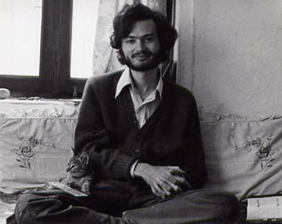Reflections on Fieldwork in Yemen: The Genealogy of a Diary in Response to Rabinow’s Reflections on Fieldwork in Morocco
by Daniel Martin Varisco

[Anthropologist at rest with cat, al-Ahjur, Yemen, 1978]
[The following excerpt is from an article recently published in Anthropology of the Middle East (Volume 1(2):35-62, 2006).]
Abstract: In preparation for writing an ethnographic monograph on fieldwork in Yemen, I compare and contrast my field diary, written in 1978–9, with Paul Rabinow’s ‘Reflections on Fieldwork in Morocco’ (1977). The underlying question is what post-fieldwork reflections reflect meaningfully about the immediacy of ethnographic fieldwork. I criticize the reflexivist trope of privileging ‘writing culture’ over the significance of ‘being there’ in the field. Point by point, I examine the implications of graduate training in anthropology, culture shock, health problems, language skills, the unreflective male voice, visual ethnography and the rhetoric of narrative writing.
Keywords: culture shock, ethnography, fieldwork, reflexivity, Visual Anthropology
Dialectic after the Fact
Fieldwork is a dialectic between reflection and immediacy. Both are cultural constructs. Our scientific categories help us recognize, describe, and develop areas of inquiry. But one cannot engage in questioning and redefining twenty-four hours a day. The scientific perspective on the world is hard to sustain. In the field there is less to fall back on; the world of everyday life changes more rapidly and dramatically than it would at home. There is an accelerated dialectic between the recognition of new experiences and their normalization. (Rabinow 1977: 38)
Twenty-five years after his death, Bronislaw Malinowski – the reputed ‘Father of Participant Observation’ – haunted the academic underpinnings of anthropology through the posthumous publication of his private field diary, originally inscripted in cryptic Polish. This was in 1967, when I was a sixteen-year old high-school junior dreaming of a career in archaeology. A decade later Paul Rabinow published his acclaimed Reflections on Fieldwork in Morocco; the year was 1977 and I was making final preparations to head off to the Yemen Arab Republic to begin my ethnographic fieldwork as a participant observer. Almost three decades later, I still have not been delivered of the monographic ‘ethnography’ that would mark my post-ethnographic-present adult status in the discipline. The task – dissecting an increasingly distant dissertation of an unmanageable 725 pages into a more feasible and hopefully more mature book that some university publisher will hope to break even on – requires at this point a cutting-edge Caesarian moment. I went, I saw, I conquered my fears; now what? If ever there was an appropriate time to set down my reflections on my fieldwork in my village, this is it.
Re-reading Rabinow at the same time as I relive my own diary entries from the field offers a fertile frame for these reflections. After all, Rabinow was one of the first to offer a reflexivist critique of his mentors, hinging on their unwillingness to let down their academically coiffured hair and tell it like it was regarding the ‘clan secrets’ about being in the field. Having been there, he wanted to know why he had not been prepared for the less than theoretical other[there]ness of this anthropological coming-of-age ritual. Rabinow, with an impetuous honesty, asked ‘leading anthropologists who espouse this “before and afterâ€â€™ view of fieldwork why they have not written on the subject themselves, since it seems to be such an important one for the field’ (1977: 4). The ‘culturally standardized’ response he received from the gentlemen in his academic gens was, ‘Yes, I suppose. I thought about it when I was young. I kept diaries, perhaps someday, but you know there are really other things which are more important’ (1977: 4). There were, at the time, ‘memoirs or anecdotal accounts of sufferings,’ including Malinowski’s (1967) infamous yet wonderfully humanizing diary of loneliness, disgust and lust. But the point for Rabinow was that ‘they all cling to the key assumption that the field experience itself is basically separable from the mainstream of theory in anthropology – that the enterprise of inquiry is essentially discontinuous from its results’ (1977: 5). My increasingly distanced sense of that alleged discontinuity, as reflected in my field diary, is what this essay is all about…
References Cited:
Malinowski, B. (1967) A Diary in the Strict Sense of the Term (New York: Harcourt, Brace and World).
Rabinow, P. (1977) Reflections on Fieldwork in Morocco (Berkeley: University of California Press). [This has recently been reprinted in the 30th anniversary edition.]
[The full article is in Anthropology of the Middle East.]